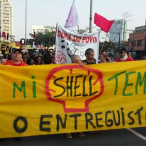English · Español

29 de mayo de 2018 | Noticias | Anti-neoliberalismo | Justicia climática y energía
New report exposes role of oil transnational company Shell in democratic rupture in Brazil
Descargar: MP3 (1.8 MB)
“The Coup that hit the target: how Shell dynamited Brazilian democracy to open Pre-Sal to foreign oil companies”. This is the title of the new report that exposed the role of Anglo-Dutch oil company Shell in the coup d´Etat of Brazil.
Friends of the Earth Brazil and Reporter Brasil Magazine recently published a report that focuses on the role of Shell and other transnational companies and foreign governments in the reforms towards exploiting oil deposit “Pre-Sal”.
The research is part of the campaign that will take Shell to court over its economic and climate crimes carried out in the Netherlands by the local member group of the environmental federation.
The document can be read online in Portuguese. “Pre-Sal” refers to the rock formation located beneath a pre-salt layer which turned into the name of a massive oil deposit in Brazil. Said deposit´s output is estimated in 100 million oil barrels.
Shell was one of the companies most favored by the opening of oil exploitation at Pre-Sal, previously reserved exclusively to Petrobras, a State company.
As if this wasn´t enough, several of its Executives are now members of the Board of the company in charge of the exploration works: the State oil company.
Together with Reporter Brasil and Friends of the Earth the Netherlands, FoE Brazil gathered all existing data “in a narrative that exposes how the opening of Pre-Sal to foreign interests is another side of the coup against Brazilian democracy”.
The report was based on information gathered through the Access to Information Law, interviews and their own research. The aim was to identify the lobby process carried out by the head of Shell with Coup President Michel Temer, referred to in some communications as the “man with the briefcase” of “tips” or “bribes”.
According to the report, “the coup government acted on behalf of Shell and other oil companies, giving away Brazil´s natural richness to international capital”.
The report is divided in eight sections that deal with the pro-market reforms carried out by Temer and the illegalities of lobby in Brazil.
The reforms are such that before the coup, the debate in Brazil focused on where to allocate investments as a result of the exploitation of Pre-Sal, while now the discussion is focusing on withdrawing investments from education in order to build gas and oil pipelines.








